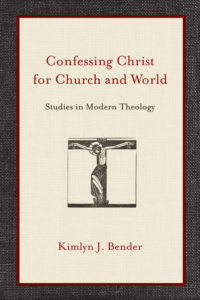
Confessing Christ for Church and World: Studies in Modern Theology
Kimlyn Bender. Confessing Christ for Church and World: Studies in Modern Theology. Downers Grove, IL: InterVarsity Press, 2014, pp. 389. $40.00 (paperback).
Reviewed by Max Heidelberger
In Confessing Christ for Church and World, Truett Theological Seminary’s Kimlyn Bender presents a collection of essays which set Karl Barth and—to a lesser extent— Friedrich Schleiermacher in conversation with the American theological landscape. Bender’s desire in this collection is to look along with (rather than at) Schleiermacher and Barth toward the “the true object… nothing less than God’s glorious breaking into our world in the person of Jesus Christ” (16). The topics range from ecclesiology to revelation to the legacy of the reformation, and are helpfully divided into three thematic sections: “Church and Conversation,” “Canon and Confession,” and “Christ and Creation.” While these three sections may appear to be thematically distinct, they are united by Bender’s thoroughgoing Christological orientation.
Bender’s commitment to confessing Christ as Lord also guides a lesser but nonetheless significant subtheme: a celebration of the legacy of the Protestant vision for American Christianity (13). For example, in a particularly stirring essay, “The End of the Reformation?”, Bender utilizes Christology to explain Protestantism’s lackluster ecclesiology: “It is the asymmetrical and irreversible relation between Christ and the church in Protestantism, with its insistence on seeing the church as a witness to the incarnation rather than its extension, that is at the root of the Protestant principle that there can be no absolutizing of the church and its dogma” (138). For Bender, as for Barth, “the church is both divine event and human institution, but with these also in irreversible order, the first giving rise to the second” (87). Given this commitment, when offered an opportunity to apologize for Protestant deficiencies in the area of ecclesiology, Bender takes the opportunity to highlight how Protestantism’s Christological center explains Protestant doctrine writ large: “None of these [doctrines] make sense if this ecclesiological distinction, which really is a Christological one, is not understood” (140). While boldly defending the viability of the Protestant vision for the church, Bender does not allow himself to become a mouthpiece for Protestant dogma. Rather, he engages his topics graciously, talking across denominational lines. Bender draws lines of sight between evangelicals and Catholics, and Baptists and Barthians, among others. What this amounts to is a collage of American Christian thought, as the essays’ scope and variety make good on Bender’s commitment to context of the North American church, in all of its diversity (14).
Issues of canon and scriptural authority are addressed along the way; see Bender’s critique of fellow Princeton Seminary alumnus Bart Ehrman in “The Canon as Theological Category,” as well as his description of Barth’s struggle to develop a doctrine of scripture in “Scripture and Canon in Karl Barth’s Early Theology.” Pushing on into cosmology and election, God’s relationship with creation is defined in Christological—and overtly Barthian—terms in “Christ, Creation, and the Drama of Redemption”: “The relation between God and the world is not a free imaginative construal; the relation itself is freely defined and determined in God’s eternal election to be God for us in Jesus Christ” (313). Along the same vein, an elegant postscript to Schleiermacher’s Christology sees Bender in agreeable conversation with Kevin Hector on the subject of Schleiermacher’s allegedly “low” Christology.
All told, Bender’s collection of essays provides space for dialogue across the American Christian spectrum, while not sacrificing his own Protestant outlook. What makes such an exchange possible is not the diversity inherent in American expressions of Christian religion, but rather Bender’s own conviction that there is common ground to be found at the center of all Protestant principles: the preeminence of Christ over church, over canon, and over creation
Max Heidelberger, MDiv Student, Princeton Theological Seminary
